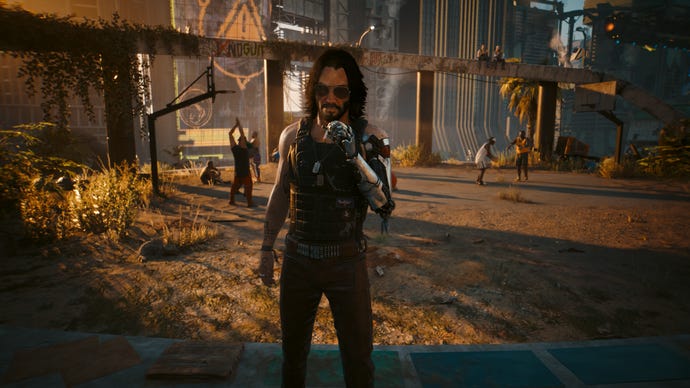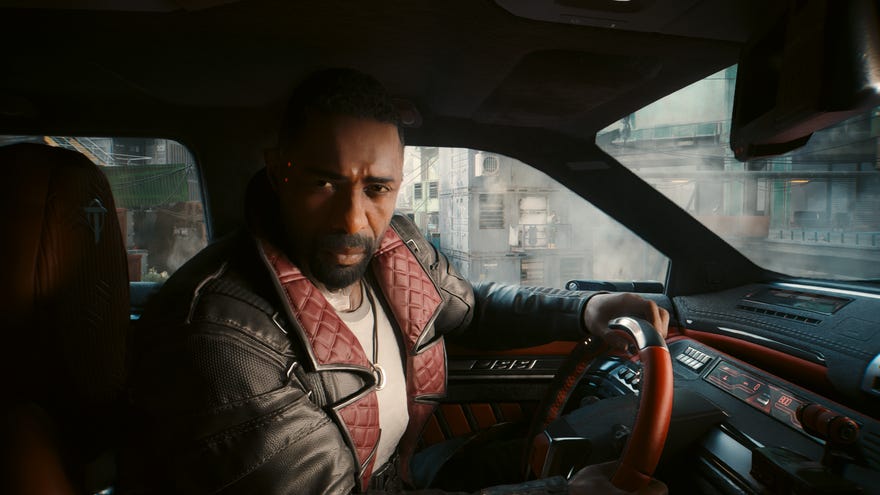Cyberpunk 2077: Phantom Liberty on HDD isn’t ideal, but at least it’s smoother than Starfield
Putting the new SSD requirement to the test
The polished-up 2.0 update for Cyberpunk 2077 is out now, ahead of its Phantom Liberty expansion on September 26th. I’ve been trying out both, partly to see if the 2.0 newly raised hardware requirement of SSD storage is a warning worth heeding.
Hard lines against hard drive installations are new to PC games, but it was only a couple of weeks ago when Starfield showed the dangers of crossing them. Broken audio, regular freeze-ups, load times so long you could measure them with a calendar... an SSD really is the only way to play Starfield, and it sounded like Cyberpunk 2077 would follow suit. "We advise against running the game on an HDD (or on a SD card on Steam Deck) due to lower bandwidth which may cause new content to not stream properly," reads CD Projekt Red’s 2.0 patch notes. That’s us told.
Having wilfully ignored this advice, I would now largely agree with it. Yes, you probably should move your Cyberpunk 2077 install to an SSD – and ignore HDD storage entirely if you’re coming in fresh for Phantom Liberty. At the same time, sticking to mechanical storage here isn’t anything like the horror show that is an SSD-deprived Starfield, and depending on your tolerance for stuttering, you may even be able to live with the drawbacks.
Unlike in Bethesda’s RPG, reality doesn’t break down entirely when Cyberpunk 2077 runs off a hard drive. Very often, there’s little indication that it’s making do with slower storage: cruising around Dogtown, a Night City district constructed entirely of the "new content" mentioned in the patch notes, performance on an ancient hard drive was generally on par with that of a PCIe 4.0 SSD. I spent more of my day watching a load screen to get there, but not to an unreasonable extent, and I couldn’t spot any egregious texture streaming failures. Audio seems totally fine, too.
When the action picks up, though, it becomes clear than HDD speeds will no longer cut it, and Cyberpunk 2077’s much-improved technical stability starts cracking like my heterosexuality whenever Idris Elba is onscreen. Combat-heavy missions invite some serious chugging, one shooty sidequest in particular suffering from a rapid succession of tension-murdering mini-freezes. Outside of these most explodey moments, the threat still looms, even when all seems well: a simple car collision is enough to trigger a stall that, for a heart-in-mouth moment, will resemble a crash of a software variety.

I’ve also played Phantom Liberty (and burned around the base game’s Night City) for a few hours on an SSD, and these problems simply don’t exist with faster storage. Even a microSD card in a Steam Deck has better luck than a mechanical HDD: the worst issues I’ve seen on the former are limited to minor stuttering and the odd wall texture taking a while to load in. Annoying, but not as prone to slowing you down. So, whether you’re just revisiting Cyberpunk 2077 for its 2.0 rejigging or you’re keen to play Phantom Liberty’s spy caper in full, upgrading to an SSD will pay dividends.
If that simply isn’t an option, then you can at least cling to the benefit of perspective. Cyberpunk 2077's HDD woes are clear, visible, and likely to pop up at least once an hour, but compared to the constant onslaught of freezes and silences that an HDD-shackled Starfield subjects you to? Merely occasional splutters are almost a relief.


